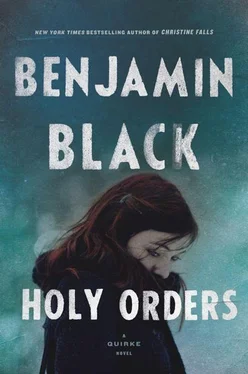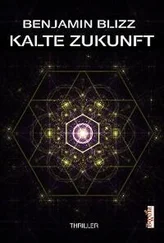When they got back to the flat Phoebe opened the door to let Sally go inside, then excused herself and went back down the stairs to the bathroom on the return, and locked the door behind herself. Sally’s neat little valise was there, under the shelf by the bath. Phoebe knelt quickly and undid the clasps, and took from a pocket of her dress the little bone-colored button she had somehow ripped from Sally’s blouse, and dropped it inside the valise, and did up the clasps again and put the valise back in its place under the shelf. She stood up. Her knees were unsteady. She turned to go, then stopped, and stood in front of the mirror on the windowsill for a long time, gazing into her own eyes.
On Monday morning Detective Sergeant Jenkins drove Quirke and Inspector Hackett in the squad car to Tallaght. Quirke had forgotten how far out it was, by the long straight road from the city. When they got there, they might have been arriving at a village in the deep heart of the country, rather than an outer suburb of the metropolis. It was early still and the main street had a sleepy look to it. All around were the soft low hills that vaingloriously called themselves mountains, their sheep-flecked slopes aglow with April’s damp and dappled greenness. Quirke viewed the picturesqueness of it all with a cold eye. Being in the open like this, exposed in the midst of so much countryside, made him feel uneasy; he was a city man, and preferred his horizons bounded. Hackett, on the other hand, seemed in his element, and was in high good spirits. This, Quirke reflected gloomily, was another of the many ways in which he and the detective differed.
On the way out, as they rolled along with the low hedges flying past and the big car swaying on its springs, Hackett reminisced aloud about Packie Joyce, wild Packie the Pike, dealer in metals, tinker chieftain and unstoppable begetter of children — it was said he had fathered as many as twenty-five or thirty offspring on a much put-upon wife, now deceased, and two or three of her redheaded sisters. “One time I got up the nerve to ask him why in the name of God did he have so many babbies,” Hackett said. “‘Listen here to me now,’ Packie said, looming over me with that big mad head of his, ‘when you’re lying in the cold in one of them drafty caravans on a winter’s night, I’m telling you, it’s either fuck or freeze.’” Quirke, sitting beside Hackett in the rear, caught Jenkins’s startled eye in the driving mirror; Inspector Hackett rarely swore, and was a famous frowner on bad language. “Oh, aye,” he said now, chuckling, “he’s some boyo, the same Packie — you’ll see.”
They were not sure where the Joyces’ campsite was, and had to stop at the village post office while Jenkins went inside to ask for directions. Hackett sat with his knees splayed and his palms resting on his thighs and looked out with lively interest upon a scene quick with the tremors of spring. Cloud shadows were pouring across the far hillsides. Quirke watched the detective sidelong and supposed he was thinking of the days of his youth in the windy Midlands. Hackett would always be a countryman.
Jenkins was gone a long time but at last returned and got in behind the wheel. “Well,” Hackett asked the back of the young man’s head, “did you find out the way?”
“Oh, I did,” Jenkins said, and produced a sound that it took the two men in the back a moment to identify as a short low laugh. “It seems Mr. Joyce is a well-known figure in these parts, all right. I had to listen for a good five minutes to the postmistress’s views on him and his tribe.”
“A certain degree of disapproval, I imagine,” Hackett said, and Jenkins once again laughed.
They reached the outskirts of the village and hesitated briefly at a crossroads, Jenkins extending his neck tortoiselike out of his collar and swiveling his head this way and that, and then turned onto an unpaved boreen. Ahead of them they saw a great pillar of rapidly rolling blackish-brown smoke. “That will be the ensign of the Joyces, I don’t doubt,” Hackett said drily. “By their fires shall ye know them.”
They made slow progress, for the narrow little road had many twists and turns and many a deep and spring-tormenting pothole. Jenkins maneuvered the big car with judicious caution. There were primroses in the hedges, and the hawthorn was in leaf already, and over the sound of the engine they could hear the shrill piping of blackbirds and even the robins’ thinner calls. “Haven’t they the life, all the same, the tinkers,” Hackett said wistfully, “out in the good air, under God’s clear sky.” He turned a teasing eye on Quirke. “Wouldn’t you say, Doctor?”
“The average tinker’s life expectancy is twenty-nine years,” Quirke said, “and the death rate among their newborn is one in three.”
Hackett sighed but seemed untroubled. “Oh, I don’t doubt it,” he said. “A good life but a short one, then.”
Quirke said no more. He was not in a mood for Hackett’s raillery; but then, he reflected, was he ever?
He had woken that morning feeling dizzy, and had lain on his back in a tangle of damp sheets for some minutes, watching the light fixture in the ceiling above him; it seemed to be jerking repeatedly from right to left, like the same miniature racing car shooting again and again past the winning flag. When at last he got up, putting one explorative foot after the other gingerly to the floor, he thought he would fall over from light-headedness. He had often suffered vertigo on mornings following drinking bouts, but that was a different sensation, more an annoyance than anything else, a thing to be endured until it wore off, as it inevitably did; that was just ordinary giddiness, and not frightening, like this new kind. He went into the kitchen in his pajamas and sat at the table in the cold, drinking cup after cup of bitter black coffee and smoking a chain of cigarettes. At first the coffee made the dizziness worse, then better, and the nicotine calmed his nerves. Yet it could not be ignored or pushed aside any longer: something was the matter with him, something was amiss.
Was he ill? There had been the hallucinations, accompanied by a general feeling of vague physical distress, and now, this morning, there was this new kind of vertigo. After his experience at Trinity Manor, when he had imagined talking to the old man in the kitchen, he had gone over it all again and again in his mind, trying to understand it, to account for it. But could a damaged mind examine its own processes, and if it could, how were its findings to be trusted? Everything might be a hallucination.
What he felt was not so much fear as a kind of wonderment, tinged with rancor. Why him, why now? The usual, vain protests. Could he not come up with anything better, anything that might actually help? He padded barefoot into the living room, keeping close to the walls for fear of falling over, and made a telephone call to his adoptive brother. Malachy himself answered, sounding wary as always. Quirke asked if he could come round, saying there was something he wanted to ask Mal’s advice on. Mal began to reply but someone spoke behind him — it sounded to Quirke like the voice of Mal’s wife, Rose — and Mal put his hand over the receiver. Quirke waited, hearing himself breathe; telephones, like mirrors, contained inside them another version of the world. Then Mal spoke again, saying that he would be in that evening, if the matter could wait until then. “Thanks, Mal,” Quirke said. “I’ll see you later.” Even the sound of Mal’s voice was some sort of comfort. Help was at hand, it seemed to say; there would be help, even for such a one as Quirke the reprobate. Good old Mal, good old dull, dependable Malachy.
Hackett was speaking again. Quirke turned to him, trying to concentrate. “What?” he said. “Sorry, my mind was…” My mind is decaying, Hackett, it’s crumbling, it’s falling asunder.
Читать дальше












